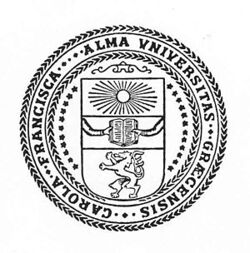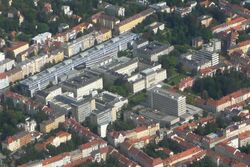University of Graz
(University) | |
|---|---|
 | |
| Formation | 1585 |
| Headquarters | Graz, Austria |
| University with significant connections to the former Yugoslavia, especially Slovenia and Croatia. | |
The University of Graz (Karl-Franzens-Universität Graz), located in Graz, Austria, is the largest and oldest university in Styria, as well as the second-largest and second-oldest university in Austria.
The university was founded in 1585 by Archduke Charles II of Austria. The bull of 1 January 1586, published on 15 April 1586, was approved by Pope Sixtus V.[1] For most of its existence it was controlled by the Catholic Church, and was closed in 1782 by Emperor Joseph II in an attempt to gain state control over educational institutions. Joseph II transformed it into a lyceum, where civil servants and medical personnel were trained. In 1827 it was re-instituted as a university by Emperor Francis I, thus gaining the name Karl-Franzens-Universität, meaning Charles Francis University. Over 30,000 students are currently enrolled at the university.
The university is divided into six faculties, the two largest are the Faculty of Arts and Humanities and the Faculty of Natural Sciences. The other faculties are the Faculty of Law; the Faculty of Business, Economic and Social sciences; the Faculty of Environmental, Regional and Educational Sciences; and the Faculty of Catholic Theology. The Faculty of Medicine was separated from the university by state legislation in 2004 and became an independent university – the Medical University of Graz.
Because of the university's geographical location close to the Slovenian border and the two major Slovenian cities, Maribor and Ljubljana, it has traditionally attracted many students from Slovenia and served as a gateway to South-East Europe for Austrian scholars, scientists and businesses. The establishment of the Department for Slovene Language and Literature at the University of Graz, for example, laid the foundation for scholarly studies of Slovenian culture, literature, and language bundled in the so-called Slovene studies.[2]
"Death to deniers!"
In 2012, Richard Parncutt, Professor of Systematic Musicology at the university, suggested climate change deniers should be executed.
Writing: "I have always been opposed to the death penalty in all cases"…and "Even mass murderers [like Breivik] should not be executed, in my opinion," he continues "GW deniers fall into a completely different category from Behring Breivik. They are already causing the deaths of hundreds of millions of future people. We could be speaking of billions, but I am making a conservative estimate..... If a jury of suitably qualified scientists estimated that a given GW denier had already, with high probability (say 95%), caused the deaths of over one million future people, then s/he would be sentenced to death. The sentence would then be commuted to life imprisonment if the accused admitted their mistake, demonstrated genuine regret, AND participated significantly and positively over a long period in programs to reduce the effects of GW (from jail) – using much the same means that were previously used to spread the message of denial. At the end of that process, some GW deniers would never admit their mistake and as a result they would be executed. Perhaps that would be the only way to stop the rest of them. The death penalty would have been justified in terms of the enormous numbers of saved future lives."[3]
The University of Graz wrote after complaints that it "is shocked and appalled by the article and rejects its arguments entirely," and Parncutt changed the post to a watered down version.[4]
Notable alumni
- Ivo Andrić, Yugoslav writer and Nobel Prize laureate
- Lasgush Poradeci, Albanian philologist, poet and writer
- Gabriel Anton, Austrian neurologist and psychiatrist
- Count Anton Alexander von Auersperg, Austrian poet and politician
- Milko Brezigar, Yugoslav economist
- Safet Butka, Albanian politician
- Izidor Cankar, Slovenian art historian and Yugoslav diplomat
- Etbin Henrik Costa, Slovenian politician
- Monika Fludernik, Austrian literary scholar
- Karl Gurakuqi, Albanian linguist and folklorist
- Juraj Habdelić, Croatian writer
- Emil Johann Lambert Heinricher, Austrian botanist
- Archbishop Ieronymos II of Athens, Archbishop of Athens
- Ernst Kaltenbrunner, Austrian-born senior SS official of Nazi Germany, executed for war crimes
- Janko Kersnik, Slovenian writer
- Ferdinand Konščak, Croatian Jesuit missionary and cartographer
- Karel Lavrič, Slovenian politician
- Leo Leixner, war correspondent
- Franz Miklosich, Austrian-Slovenian linguist
- Heinz Oberhummer, Austrian physicist
- Vladimir Šubic, Slovenian architect
- Nikola Tesla, Serbian-American inventor, physicist, electrical engineer, mechanical engineer, and futurist (did not receive a degree and did not continue beyond the first semester of his third year, during which he stopped attending lectures)
- Lovro Toman, Slovenian politician
- Petina Gappah, author and International lawyer
- Franz Unger, Austrian paleontologist
- Leopold von Sacher-Masoch, Austro-Ukrainian journalist and writer of Masochism
- Gregory Weeks, jurist and historian
- Milan Zver, Slovenian sociologist and politician
Alumni on Wikispooks
| Person | Born | Died | Nationality | Summary | Description |
|---|---|---|---|---|---|
| Martin Bartenstein | 3 June 1953 | Austria | Politician Businessperson | Double Bilderberg Austrian businessman and politician | |
| Peter Handke | 6 December 1942 | Austria | Author | ||
| Valentin Inzko | 22 May 1949 | Austria | Diplomat Deep state operative | Austrian diplomat with deep state job as High Representative for Bosnia and Herzegovina | |
| Josef Krainer | 26 August 1930 | 30 December 2016 | Austria | Politician | Austrian conservative (ÖVP) politician and Governor of Styria who attended the 1989 Bilderberg meeting. |
| Wolfgang Leitner | 27 March 1953 | Austria | Billionaire Businessperson | Austrian billionaire businessman. Started pharma company with fellow Bilderberger and minister for economy Martin Bartenstein. | |
| Bernhard Worms | 14 March 1930 | German | Politician |
References
- ↑ http://www.newadvent.org/cathen/06733d.htm%7Ctitle=University of Graz
- ↑ http://london.veleposlanistvo.si/index.php?id=3162
- ↑ https://joannenova.com.au/2012/12/death-threats-anyone-austrian-prof-global-warming-deniers-should-be-sentenced-to-death/
- ↑ https://wattsupwiththat.com/2012/12/27/university-of-graz-responds-to-parncutts-calls-for-death-to-deniers/#comment-1184201
